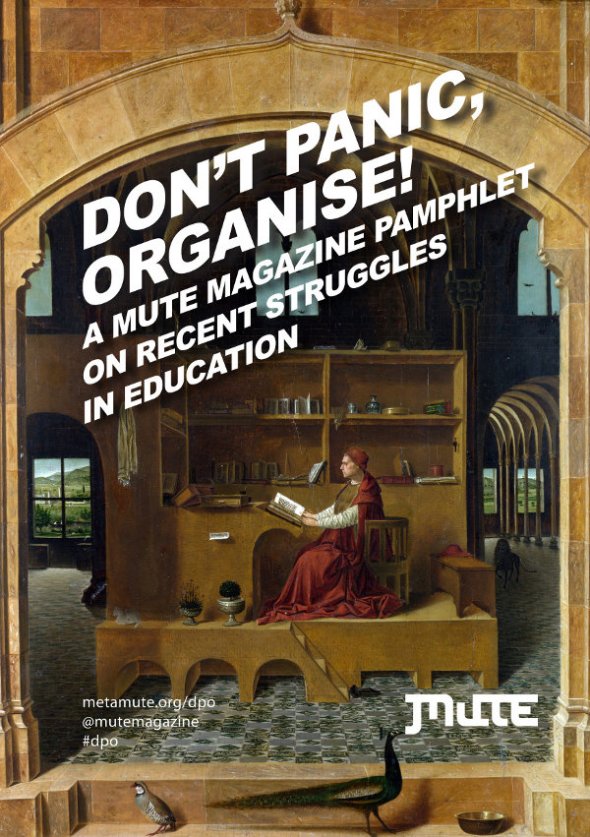Don't Panic, Organise! A Mute Magazine Pamphlet on Recent Struggles in Education
If you are fighting the cuts to the UK's education system (occupying, sitting in, demonstrating, planning further actions), <i>Mute</i> will donate copies of our Don't Panic Organise! pamphlet. Come by and collect them or pay P&P and have them sent to you. Your group can then sell these pamphlets (we recommend a price of£1.99), and use the proceeds to support your campaign. Contact us at: caroline@metamute.org or 020 3287 9005.
If you are not associated with a group and would like to buy the pamphlet for £1.99 (+£1 P&P), * the money will go towards supporting the cost of making and distributing the pamphlet to activists.
£1.99 (+£1 P&P) free ebook https://www.smashwords.com/books/view/49035
CONTENTS:
Introduction by Mute Editorial CollectiveUniversity Struggles at the End of the Edu-Deal by George CaffentzisStruggle as a Second Language by B&R Beyond Measure by Anonymous Great Protest, Shame About the ‘Despicable Minority’ – NUS Leaders by Sandra Morgan An NUS Steward Tried to ‘Clegg’ Me by Heidi Liane Hasbrouck Widening Participation by Anathematician Increased student fees constitute a socially progressive graduate tax in all but name** Taken from ‘Frequently Asserted Fallacies of the Crisis and How to Quash Them’ by the Mute Collective and Danny Hayward
The cuts, lay-offs and tuition-fee hikes that are besetting higher and further education internationally are undoubtedly a direct response to financial crisis and its ricocheting bomb of personal, commercial and national debt. But they also have deeper roots. They should be understood as part of the more gradual process of what George Caffentzis, in his analysis of the international situation, calls the ‘breakdown of the edu-deal’; the inability for capital, and therefore the state, to pay for the costs of producing a well educated workforce or to guarantee that investment in education will result in a more vigorous economy and increased living standards for those with qualifications.
This breakdown, and the dogmatism of free market economics which seeks to alleviate it, has seen the imposition of a business rationale onto what previously had been regarded as the provision of a public service, sometimes even a public good in the UK and across Europe. From the investment of endowment funds on the market, to the conversion of students into (badly ripped off) consumers, to the no-frills fixed-term contracts being doled out to staff, to the speculative purchase of the future IP generated by scientific and technical departments, to the intended exchangeability of all qualifications under the Bologna Process, education is being ever more deeply determined by free market principles.
With the ground changing this fast under staff and students’ feet, the ability for collective action to fight the savage rounds of cuts has itself suffered as a result of a generalised precarity and fragmentation. Mute’s interview with two organisers of last summer’s strike at Tower Hamlets College reminds us that attacks on education workers and students are not soley motivated by financial concerns, but also comprise an attack on our working culture (our rights, values and expectations more generally). Despite the hostile conditions, we have nevertheless seen a persistent and recently growing wave of strikes, actions and occupations, both wildcat and union co-ordinated, breaking out around the world. Sixth formers, students, staff and those with a less personal stake in education are uniting in a new plane of struggle. However, a number of the reports included here stress the growing tension between the particularity of the cuts to the education sector and the more general ‘public sector fight back’ that is emerging. Despite the need to recognise the distinctions within the education sector itself (between academic staff and students on one hand, and non-academic staff on the other) there is a distinct danger of forming a coalition solely amongst students and workers who used to be students.
The student occupation at Middlesex University over the summer of 2010, as well as the more recent spate of occupations and sit-ins in universities, schools, art galleries and other public spaces across Britain, have nevertheless ushered in a moment full of potential. Not only have they sought to be inclusive, but they have also shown the growing irrelevance of student leaders and old style mass-organising. Heidi Liane Hasbrouck’s piece on the NUS’s denunciation of the Millbank riot highlights this moment of self-realisation. There is a widening recognition of a need to self-organise and continually push at the borders of the possible. This is not ‘68 redux; and a better thing for it.
All of this begs the question, will this fight-back be enough to save any residual quality and equality within education and its institutions? Mute began compiling a mini-dossier of reports, questionnaires and analyses on the crisis and struggles within education in May 2010, as it was unfolding in the UK and beyond. Since the magnificent occupation of the Tory headquarters at Millbank on 9 November – which seemed to jolt people out of their despair or slumbers – many more reports on education struggles have been published in Mute. Here we present you with a selection of some of the most urgent.
EBook ISBN: 978-1-906496-55-5
Available in Print-- ISBN: 978-1-906496-54-8
Mute Books Orders
For Mute Books distribution contact Anagram Books
contact@anagrambooks.com
For online purchases visit anagrambooks.com







